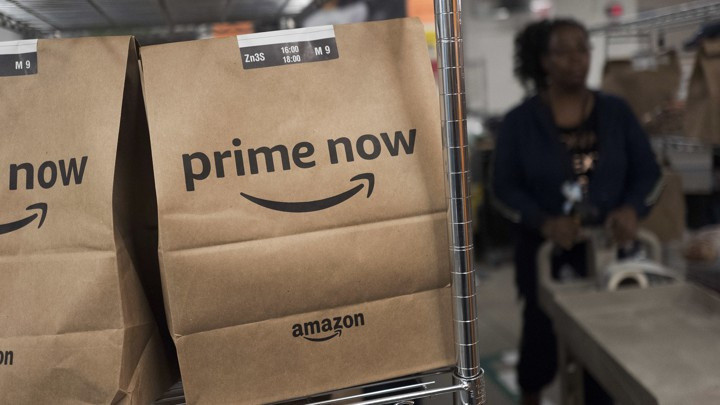This article comes from 36 氪 compilation team “God Translation Bureau”, translator Yi Tang, love Fan Er is authorized to release.
Editor’s note: According to Amazon’s operation, consumers can exchange their browser data for $10 worth of points, which is an investment for Amazon, but the reason is It’s definitely more than just a simple “data privacy protection.” To a certain extent, this is Amazon’s preparation for achieving its goal of segmenting users in order to promote a more indirect and effective revenue-generating strategy. Author SIDNEY FUSSELL, original title What Amazon Thinks You’re Worth.

▲Source: MARK LENNIHAN / AP
Imagine, on a bright afternoon, you are drinking coffee in a coffee shop, and then the owner of the store is holding a $10 bill in his hand and slowly coming towards you, hoping that you can answer some questions. Content includes but is not limited to: How did you hear about this store? How did you come? Is it walking or sitting Uber? Which product is more attractive? Which product do you think does not meet your expectations? These questions are simple in themselves, so the answer is not that difficult. You took the $10 to you with little effort.
Then, you find yourself experiencing this experience while browsing the web: Amazon CEO Jeff BezosIt will also come to you slowly as you browse the web. It will also give you $10, and then you can learn more about how you shop through your search history. In this case, do you have a different reaction?
Amazon offers users a choice: if users download Amazon Assistant apps to their browser, they can earn $10.
Amazon Assistant combines browser extensions, shopping assistants, and referral tools. When you hover over an item while shopping on another website, it compares the item you are looking at with a similar item on Amazon. In this way, if Amazon’s products are cheaper, users are likely to choose the latter. But the app also allows Amazon to access the user’s browser data, including the URL of the page the user visited, the search term, the search results, and the metadata for those pages. Amazon also offered this service last year, but last year only offered $5.
In a statement to The Atlantic, a spokesperson for Amazon said that Amazon has always valued the privacy of consumers, and this assistant application is completely free to choose from consumers. “The use of Amazon Assistant will always comply with Amazon’s Privacy Policy and Notice about Amazon Assistant Privacy. Amazon collects information only from the websites that customers browse, and may then have related product or service recommendations. But it will never This information is connected to the customer’s Amazon account unless they interact with Amazon Assistant.”
In another statement that was later provided, Amazon clarified that Amazon Assistant does not collect personally identifiable information about users. The statement states: “The product or price data that Amazon Assistant automatically collects is not tied to any customer ID, and we do not use the information that Amazon Assistant collects in our advertising business.”
When people talk about “buy” and “sell” data, they are usually talking about any complex algorithmic process that technology companies profit from user behavior. But this is actually an inaccurate metaphor, and companies are often annoyed about it. In a word, Amazon’s privacy statement claims that the company “does not sell” user data activities, and Facebook’s head Mark Zuckerberg often said the same thing, so that this has become a classic joke in the industry.
The two companies are technically blameless. They really don’t sell user information to third parties—they just use that information to sell targeted ads and get a lot of revenue. Data and money exchange are not directAnd the participants involved are far more than the users and the company. Therefore, these technology giants do not need to buy or sell user data to profit from it.
In addition, this data is never yours, nor is it entirely yours. Google (or should or Yahoo) knows all the search terms that lead to any particular purchase. Amazon is not really “buying” the data you “own”, but paying for access to data tracks that other companies are already using.
Know that data exchange is not a typical market behavior and cannot be understood in this way. People don’t “own” their data as they think. Specifically, Facebook and Amazon have not “purchased” or “sold” it. They do collect as much information as possible, but only as an indirect but effective revenue-generating strategy.
For Amazon, providing points to users is not a purchase, but an investment. These companies are now giving you a small amount of money because it will make more money from you in the future. Amazon will use your purchase data to calibrate its positioning, split its vast user base into more granular categories, and then “recommended” for “users” more clearly. This is what Amazon really “buy”: raw materials that provide extra power to its target market. In the long run, this is likely to pay off: Imagine that as soon as you log in to Amazon, it will immediately give you advice on products that are accurate, reasonably priced, and your favorite style. Then look back and see that Amazon is preparing for the massive collection of this extra data.
This type of transaction has a strong asymmetry. More accurate advertising does not mean enhancing privacy protection, anonymous shopping, or being constrained by predictive recommendation algorithms. In fact, investing in one of these options means losing other options. Privacy can’t be bought, but it can be sold.